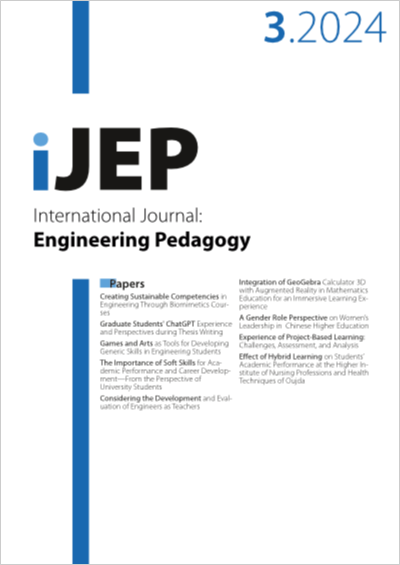Games and Arts as Tools for Developing Generic Skills in Engineering Students
DOI:
https://doi.org/10.3991/ijep.v14i3.46229Keywords:
game-based learning, art, generic skills, higher education, teaching strategies, engineering, artistic toolsAbstract
In today’s educational landscape, the integration of innovative pedagogical approaches is essential for improving student learning. In this respect, game-based learning appears to be a strategy that not only actively engages students—who often struggle to understand scientific concepts, leading to negative emotions and discouragement—but also helps them acquire transferable skills. Particularly in the field of telecommunications engineering, where the practical application of knowledge is essential, the use of educational games offers a unique opportunity to explore and reinforce specific and general skills. In this study, a cross-sectional quantitative methodology was implemented using a representative sample of 64 undergraduate students in the sixth semester of the telecommunications engineering program at a public university. In general, educational games are primarily intended to evoke emotions in participants, such as enjoyment, to help them cultivate a “receptive learning mindset” and to effectively teach a specific subject. In contrast to these approaches, the game proposed in this study incorporates humanistic skills and artistic tools to construct antennas within a specific context. This enabled students to engage in a practical, applied learning experience in their field of study, focusing on three key aspects: appropriating knowledge, building values, and learning about life, as well as recognizing others in society and interacting with the environment. The results obtained using the proposed game-based strategy were compared with those obtained using conventional teaching tools. The results showed that play not only imparted knowledge but also contributed to students’ overall development by fostering the values and skills essential to their personal and professional success. The results underscore the significance of developing games that authentically simulate project processes and activities. This emphasizes the importance of aligning game dynamics with real-world challenges and situations in the field of telecommunications engineering. This simulation-based approach may be the key to maximizing the impact of game-based learning on the training of future professionals in this field. This comparative study helps fill a gap in knowledge about game-based learning in engineering education by providing valuable insights. It is also important to comprehend the impact of game-based learning on an antenna course and the students’ willingness to engage with this innovative teaching style in the classroom.
Downloads
Published
How to Cite
Issue
Section
License
Copyright (c) 2024 Sara Yepes Zuluaga, Margarita María Pineda Arias

This work is licensed under a Creative Commons Attribution 4.0 International License.



